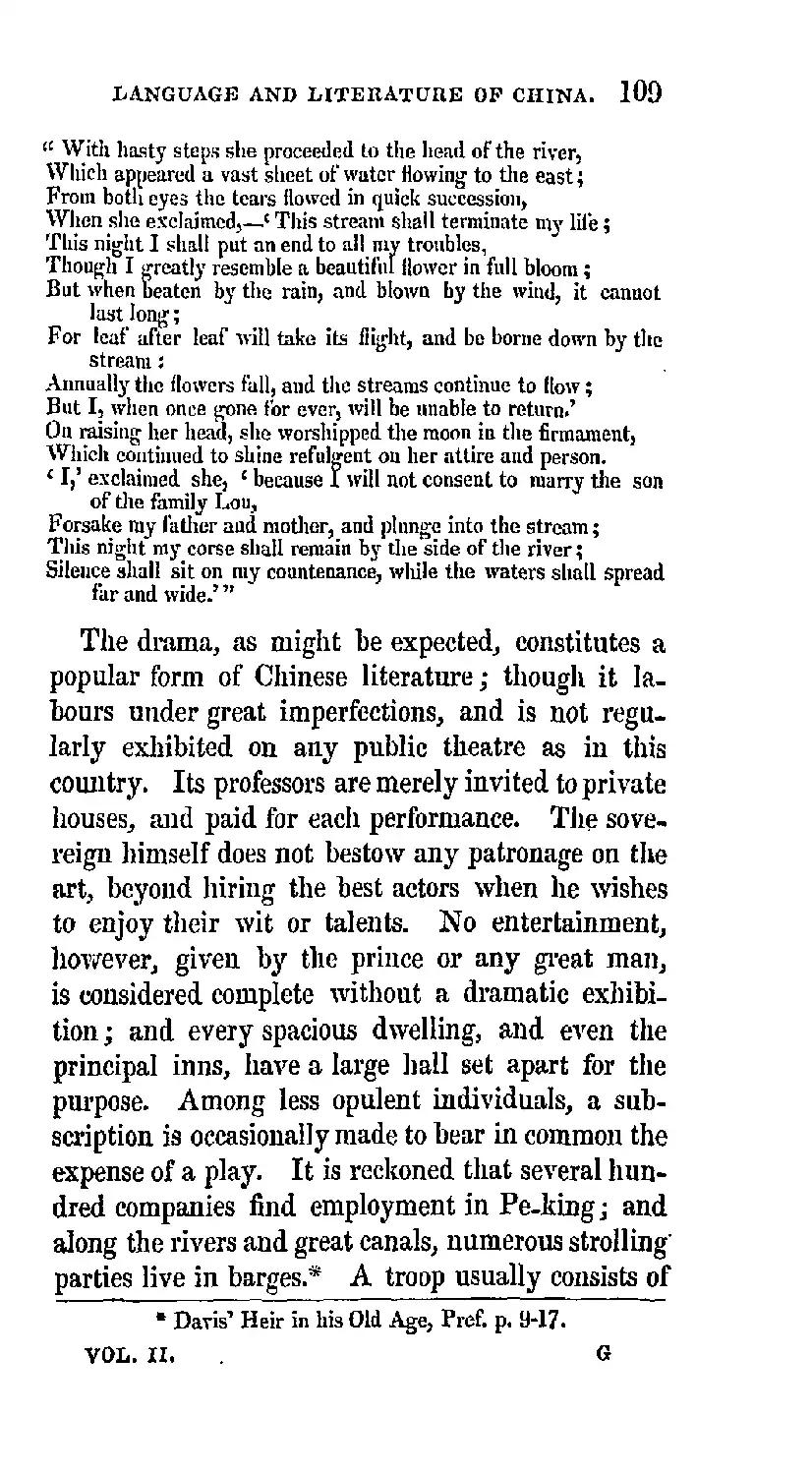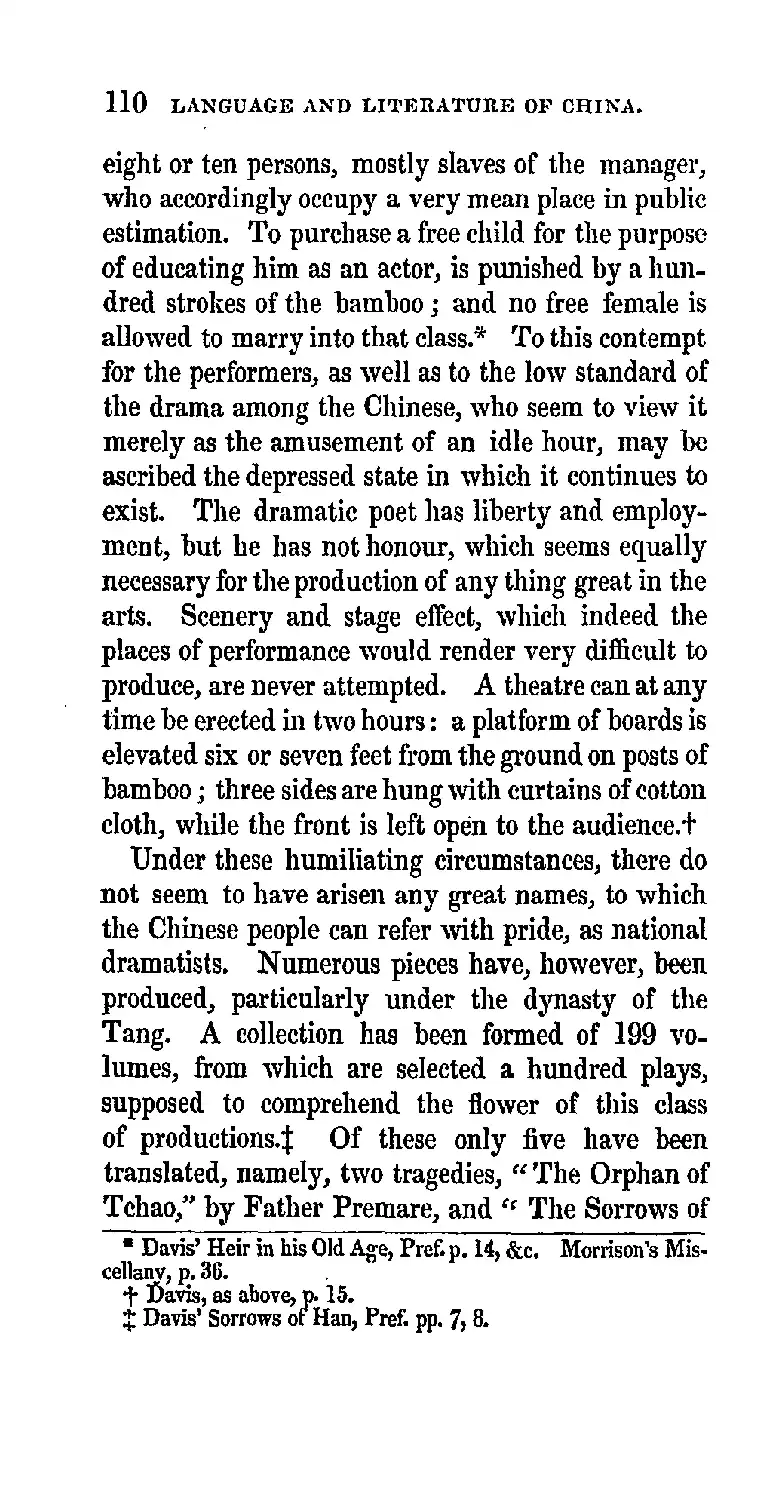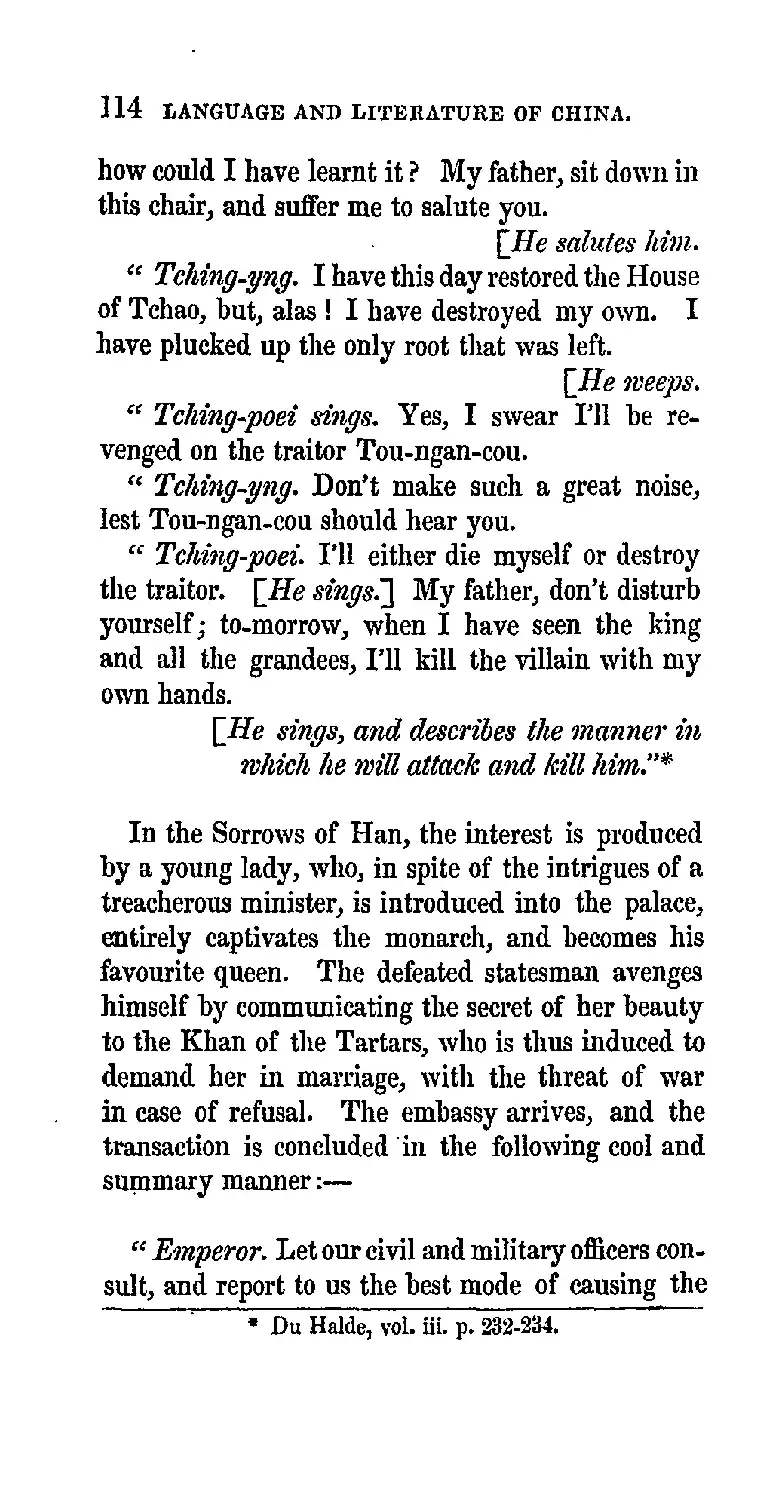An Historical and Descriptive Account of China
- Info
- Pages
- Transcript
- Related
The drama, as might be expected, constitutes a popular form of Chinese
literature; though it labours under great imperfections, and is not
regularly exhibited on any public theatre as in this country, its
professors are merely invited to private houses, and paid for each
performance. The sovereign himself does not bestow any patronage on the
art, beyond hiring the best actors when he wishes to enjoy their wit or
talents. No entertainment, however, given by the prince or any great
man, is considered complete without a dramatic exhibition; and every
spacious dwelling, and even the principal inns, have a large hall set
apart for the purpose. Among less opulent individuals, a subscription is
occasionally made to bear in common the expense of a play. It is
reckoned that several hundred companies find employment in Pe-king; and
along the rivers and great canals, numerous strolling parties live in
barges.[1] A troop usually consists of eight or ten persons, mostly
slaves of the manager, who accordingly occupy a very mean place in
public estimation. To purchase a free child for the purpose of educating
him as an actor, is punished by a hundred strokes of the bamboo; and no
free female is allowed to marry into that class.[2] To this contempt for
the performers, as well as to the low standard of the drama among the
Chinese, who seem to view it merely as the amusement of an idle hour,
may be ascribed the depressed state in which it continues to exist. The
dramatic poet has liberty and employment, but he has not honour, which
seems equally necessary for the production of any thing great in the
arts. Scenery and stage effect, which indeed the places of performance
would render very difficult to produce, are never attempted. A theatre
can at any time be erected in two hours: a platform of boards is
elevated six or seven feet from the ground on posts of bamboo; three
sides are hung with curtains of cotton cloth, while the front is left
open to the audience.[3]
Under these humiliating circumstances, there do not seem to have arisen
any great names, to which the Chinese people can refer with pride, as
national dramatists. Numerous pieces have, however, been produced,
particularly under the dynasty of the Tang. A collection has been formed
of 199 volumes, from which are selected a hundred plays, supposed to
comprehend the flower of this class of productions.[4] Of these only
five have been translated, namely, two tragedies, “The Orphan of Tchao,”
by Father Premaré, and “The Sorrows of Han,” by Mr Davis ; and three
comedies, “The Heir in his Old Age,” by the latter gentleman, “The
Circle of Chalk,” by M. Stanislas-Julien, and “The Intrigues of a
Waiting-maid,” by M. Bazin. This, no doubt, is but a small portion of so
great a mass; yet, as it consists of favourite productions, chosen by
judicious translators, the Chinese drama will not probably have cause to
complain of being judged according to such specimens.
On perusing even the best of these compositions, we at once discover
that the dialogue is nearly as rude and inartificial as the scenery.
Instead of allowing characters and events to be developed in the
progress of the piece, each performer, on his first entry, addresses the
audience, and informs them who and what he is, what remarkable deeds he
has performed, and what are his present views and intentions. On these
occasions he speaks completely in the style of a third person, stating,
without veil or palliation, the most enormous crimes, either committed
or contemplated. The unities, which have been considered so essential to
a classic drama, are completely trampled under foot; and even the
license as to time and place, to which Shakspeare has accustomed a
British audience, is far exceeded. The Orphan of Tchao is born in the
first act, and before the end of the drama figures as a grown man. In
the “Circle of Chalk,” a young lady in one scene receives and accepts
proposals of marriage; in the next, she appears with a daughter aged
five years. The tragedies labour under a much more serious defect, in
the absence of impassioned and poetic dialogue. The performer, in the
most critical and trying moments, makes no attempt to express his
sorrows in corresponding language. Action alone is employed, which
affords a genuine, indeed, though not very dramatic indication of the
depth of his feelings. The hero, in the most tragic scenes, strangles
himself, or stabs his enemy, with the same coolness as if he had been
sitting down to table. This defect may probably be connected with the
national character; with that stately reserve maintained, especially by
public men, studious of decorum, and continually under the eye of
jealous superiors. This seems the more probable, since, in private life
and to intimate friends, they sometimes give utterance to their emotions
with considerable warmth. These dramas, however, cannot be read without
some interest. The incidents are affecting, the situations striking;
there is a continued movement and action; one impressive scene closely
follows another, without those long speeches and languid intervals,
which can scarcely be avoided by writers who must fill up a drama
expected to occupy a certain portion of time and space.
The “Orphan of Tchao” includes a plot of so much interest, that it was
adopted by Voltaire as the basis of a successful tragedy. A tyrannical
minister, abusing the favour of his sovereign, satiates his vengeance on
a hated rival, whom he not only puts to death, but extirpates his
family, to the number of three hundred. An infant boy, however, is
rescued, and reared by the family-physician as his own son, in which
character the youth becomes a favourite of the murderer. On his reaching
the age of twenty, the supposed father discloses the secret of his birth
to the youth, who then becomes an instrument in avenging the wrongs of
his house. The disclosure gives rise to the most striking scene in the
play, and one marked by more than usual animation. Tching-yng, the
physician, having prepared the youth by a figurative representation of
the history of his family, then proceeds:—
“It is now twenty years since this happened, and the Orphan of the House
of Tchao must be now of the same age, and never thinks of revenging his
parents; what, then, does he think of? He is handsomely shaped, is above
five feet high, knows letters, and is very skilful in the exercise of
arms. What is become of his grandfather in the chariot? All the family
have been cruelly massacred; his mother was hanged, his father stabbed,
and hitherto no revenge has been taken. Sure they do him wrong, when
they talk of him as a man of courage.
“Tching-poei. My father, you have talked to me a long while, and 1 seem
to be in a dream, for I can comprehend nothing that you speak of.
“Tching-yng. Since you are yet ignorant of my drift, I'll speak more
plainly. The barbarous man in red is Tou-ngan-cou, Tchao-tun is your
grandfather, Tchao-so is your father, the princess is your mother, I am
the old physician Tching-yng, and you are the Orphan of the House of
Tchao.
“Tching-poei. How! am I the Orphan of the House of Tchao? Alas! you kill
me with grief and rage.
[He falls down in a fainting-fit.
“Tching-yng. My young master, recover yourself again!
“Tching-poei. Alas! you have almost destroyed me. [He sings.] If you had
not told me all this, how could I have learnt it? My father, sit down in
this chair, and suffer me to salute you.
[He salutes him.
“Tching-yng. I have this day restored the House of Tchao, but, alas! I
have destroyed my own. I have plucked up the only root that was left.
[He weeps.
“Tching-poei sings. Yes, I swear I'll be revenged on the traitor
Tou-ngan-cou.
“Tching-yng. Don't make such a great noise, lest Tou-ngan-cou should
hear you.
“Tching-poei. I’ll either die myself or destroy the traitor. [He sings.]
My father, don’t disturb yourself; to-morrow, when I have seen the king
and all the grandees, I’ll kill the villain with my own hands.
[He sings, and describes the manner in which he will attack and kill
him”[5]
In the Sorrows of Han, the interest is produced by a young lady, who, in
spite of the intrigues of a treacherous minister, is introduced into the
palace, entirely captivates the monarch, and becomes his favourite
queen. The defeated statesman avenges himself by communicating the
secret of her beauty to the Khan of the Tartars, who is thus induced to
demand her in marriage, with the threat of war in case of refusal. The
embassy arrives, and the transaction is concluded in the following cool
and summary manner:—
“Emperor. Let our civil and military officers consult, and report to us
the best mode of causing the foreign troops to retire, without yielding
up the princess to propitiate them. They take advantage of the compliant
softness of her temper. Were the Empress Leu-hou alive,—let her utter a
word,— which of them would dare to be of a different opinion? It would
seem, that for the future, instead of men for ministers, we need only
have fair women to keep our empire in peace.
“Princess. In return for your majesty’s bounties, s it is your
handmaid’s duty to brave death to serve you. I can cheerfully enter into
this foreign alliance for the sake of producing peace, and shall leave
behind me a name still green in history. But my affection for your
majesty, how am I to lay aside!
“President. I entreat your majesty to sacrifice your love, and think of
the security of your dynasty. Hasten, sir, to send the princess on her
way.
“Emperor. Let her this day advance a stage on her journey, and be
presented to the envoy. Tomorrow we will repair as far as the bridge of
Pah-ling, and give her a parting feast.”
Yet, it must be confessed, that afterwards, in private, he laments his
loss in very affecting terms:—
“Did I not think of her, I had a heart of iron. The tears of my grief
stream in a thousand channels. This evening shall her likeness lie
suspended in the palace, where I will sacrifice to it. Since the
princess was yielded to the Tartars, we have not held an audience. The
lonely silence of night but increases our melancholy. We take the
picture of that fair one, and suspend it here, as some small solace to
our griefs. Hark! the passing fowl screamed twice or thrice; can it know
there is one so desolate as I? Yon doleful cry is not the note of the
swallow on the carved rafters, nor the song of the variegated bird upon
the blossoming tree. The princess has abandoned her home. Know ye in
what place she grieves, listening, like me, to the screams of the
wild-bird?”
Again, however, when intelligence is brought that the object of his
tenderness, on arriving at the banks of the Amour, has plunged into the
waters, and that the khan, affected by her fate, has delivered up the
guilty minister, the tidings are received with the same business-like
apathy.
“Then strike off the traitor’s head, and be it presented as an offering
to the shade of the princess. Let a fit banquet be got ready for the
envoy.”
These dramas are interspersed with stanzas of poetry, introduced often
on the most critical occasions, like the songs in an English opera.
These were injudiciously omitted by Premare; but Mr Davis has given some
specimens, and M. Stanislas-Julien has translated all those which occur
in his piece. In the impassioned scenes of deep tragedy, these effusions
cannot be considered as natural or seasonable; yet they are often
possessed of merit. The following stanza, put in the mouth of the Khan
of the Tartars, though not very likely to be sung by that person, is not
devoid of beauty:—
“The autumnal gale blows wildly through the grass, amidst our woollen
tents,
And the moon of night, shining on the rude huts, hears the lament of the
mournful pipe;
The countless hosts, with their bended bows, obey me as their leader;
Our tribes are the distinguished friends of the family of Han.”
With regard to the poems in the “Circle of Chalk,” it may be remarked
that they form integral parts of the dialogues from which they scarcely
differ in character; and also that, but for the special indication that
they are poetry, they could not be distinguished from the prose.
The comic dramas have the same structure, and nearly the same defects
with the tragic. They do not display those varieties and nice shades of
character, nor those sallies of humour, which enliven the European; but
they are, nevertheless, diversified with striking incidents, and exhibit
a genuine picture of Chinese life. They are, in fact, novels in a
dramatic form, and the observations on the former species of composition
will apply to them. The incident with which the “Circle of Chalk”
terminates has a striking similarity to that of the judgment of Solomon.
A circle of chalk is formed round the child, of which the two female
claimants are desired to take hold, and each draw it towards herself:
and she who succeeds in wresting it from the other is to be adjudged the
mother. The real parent proves her claim to that character, by refusing
to subject the infant to so dangerous a predicament. The coincidence is
probably accidental, and the description in the Sacred Volume is much
happier and more effective.
[1] Davis’ Heir in his Old Age, Pref. p. 9-17.
[2] Davis’ Heir in his Old Age, Pref. p. 14 &c. Morrison’s Miscellany,
p. 36.
[3] Davis, as above, p. 15.
[4] Davis’ Sorrows of Han, Pref. pp. 7, 8.
[5] Du Halde, vol. iii. p. 232--3-1.








